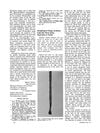 51 citations,
March 2006 in “Bioorganic & Medicinal Chemistry”
51 citations,
March 2006 in “Bioorganic & Medicinal Chemistry” Newly made nicotinamide compounds could potentially treat cancer.
 49 citations,
July 2009 in “Fitoterapia”
49 citations,
July 2009 in “Fitoterapia” Essential oils from Chamaecyparis obtusa may help hair grow by increasing a growth-related gene.
 47 citations,
July 2014 in “European Journal of Pharmaceutics and Biopharmaceutics”
47 citations,
July 2014 in “European Journal of Pharmaceutics and Biopharmaceutics” Scientists created a gel with nanoparticles to deliver medicine to hair follicles effectively.
 47 citations,
July 1967 in “Science”
47 citations,
July 1967 in “Science” Not eating enough protein can cause hair roots to shrink and lose color, and hair to become thinner.
 46 citations,
August 2019 in “Journal of Ethnopharmacology”
46 citations,
August 2019 in “Journal of Ethnopharmacology” Eclipta prostrata has many traditional uses and health benefits, but more research is needed to understand how it works and ensure it's safe.
 46 citations,
August 1990 in “The Journal of clinical endocrinology and metabolism/Journal of clinical endocrinology & metabolism”
46 citations,
August 1990 in “The Journal of clinical endocrinology and metabolism/Journal of clinical endocrinology & metabolism” Ketoconazole reduced hair growth and improved acne in women, but caused side effects needing careful monitoring.
 44 citations,
March 2012 in “Fitoterapia”
44 citations,
March 2012 in “Fitoterapia” Germacrone from Curcuma aeruginosa may help treat conditions related to male hormones by blocking a specific enzyme.
 44 citations,
January 2007 in “Biological & pharmaceutical bulletin”
44 citations,
January 2007 in “Biological & pharmaceutical bulletin” Black pepper leaf extract contains compounds that can block testosterone effects and promote hair growth.
 43 citations,
February 2020 in “Clinica chimica acta”
43 citations,
February 2020 in “Clinica chimica acta” Nano-sized plant-based chemicals could improve cervical cancer treatment by being more effective and causing fewer side effects than current methods.
 42 citations,
March 2014 in “European Journal of Pharmacology”
42 citations,
March 2014 in “European Journal of Pharmacology” Ginsenoside F2 from ginseng may increase hair growth better than standard treatments by affecting cell growth signals.
 38 citations,
January 2002 in “Biological & Pharmaceutical Bulletin”
38 citations,
January 2002 in “Biological & Pharmaceutical Bulletin” Lygodii Spora extract may help treat hair loss by blocking a hair loss-related enzyme and promoting hair growth.
 31 citations,
September 2009 in “Natural Product Research”
31 citations,
September 2009 in “Natural Product Research” Citrullus colocynthis fruit extract may effectively treat testosterone-related hair loss, similar to finasteride.
 31 citations,
August 1975 in “Journal of Pharmaceutical Sciences”
31 citations,
August 1975 in “Journal of Pharmaceutical Sciences” Minoxidil metabolizes similarly in monkeys and humans, but differently in dogs and rats.
 29 citations,
August 1985 in “Contact Dermatitis”
29 citations,
August 1985 in “Contact Dermatitis” Minoxidil can cause allergic reactions like burning, itching, and red bumps.
 28 citations,
January 2017 in “Critical Reviews in Therapeutic Drug Carrier Systems”
28 citations,
January 2017 in “Critical Reviews in Therapeutic Drug Carrier Systems” Nanomaterials in biomedicine can improve treatments but may have risks like toxicity, needing more safety research.
 25 citations,
April 2006 in “British Journal of Dermatology”
25 citations,
April 2006 in “British Journal of Dermatology” Finasteride lowers scalp and blood DHT levels, potentially treating male-pattern baldness.
 23 citations,
April 1999 in “The Journal of Clinical Endocrinology and Metabolism”
23 citations,
April 1999 in “The Journal of Clinical Endocrinology and Metabolism” All treatments reduce hair growth; low dose flutamide most effective with fewer side effects.
 22 citations,
April 2015 in “Current problems in dermatology”
22 citations,
April 2015 in “Current problems in dermatology” Human hair follicles have a unique metabolism that changes between growth stages and may contribute to baldness.
 20 citations,
February 2009 in “Chemistry & Biodiversity”
20 citations,
February 2009 in “Chemistry & Biodiversity” Ganoderma lucidum may help treat prostate cancer by blocking male hormones and slowing cancer cell growth.
 19 citations,
January 2016 in “Biological & Pharmaceutical Bulletin”
19 citations,
January 2016 in “Biological & Pharmaceutical Bulletin” Sargassum muticum extract and its component apo-9'-fucoxanthinone may help hair growth and treat hair loss.
 19 citations,
August 2014 in “Journal of Ethnopharmacology”
19 citations,
August 2014 in “Journal of Ethnopharmacology” The study created a test that found hormonal and toxic effects in plant and fungal extracts using prostate cancer cells.
 19 citations,
December 2013 in “European journal of pharmaceutics and biopharmaceutics”
19 citations,
December 2013 in “European journal of pharmaceutics and biopharmaceutics” Encapsulated Garcinia mangostana extract in cream penetrates skin better than other forms.
 19 citations,
September 1989 in “Journal of The American Academy of Dermatology”
19 citations,
September 1989 in “Journal of The American Academy of Dermatology” Minoxidil treatment may cause hair loss.
 18 citations,
October 2018 in “Nutrients”
18 citations,
October 2018 in “Nutrients” Annurca apple extract promotes hair growth by changing hair follicle metabolism to boost keratin production.
 15 citations,
April 2008 in “Steroids”
15 citations,
April 2008 in “Steroids” The more lipophilic the progesterone derivative, the better it binds to androgen receptors and has antiandrogenic effects.
 14 citations,
February 2021 in “International Journal of Pharmaceutics”
14 citations,
February 2021 in “International Journal of Pharmaceutics” Deer antler velvet serum helps hair grow and is safe for skin.
 14 citations,
November 2020 in “International Journal of Biological Macromolecules”
14 citations,
November 2020 in “International Journal of Biological Macromolecules” Mushroom-based scaffolds help heal skin wounds and regrow hair.
 14 citations,
December 2011 in “Archives of Dermatological Research”
14 citations,
December 2011 in “Archives of Dermatological Research” Phyto-vesicles of β-sitosterol may effectively treat hair loss.
 13 citations,
January 2017 in “Molecules”
13 citations,
January 2017 in “Molecules” Compounds from Alpinia zerumbet may help with hair regrowth and cancer treatment by targeting PAK1.
 13 citations,
May 2011 in “Bioorganic & Medicinal Chemistry”
13 citations,
May 2011 in “Bioorganic & Medicinal Chemistry” Changing the 6-position on benzopyran molecules affects insulin release, with some compounds showing strong inhibitory effects.






























